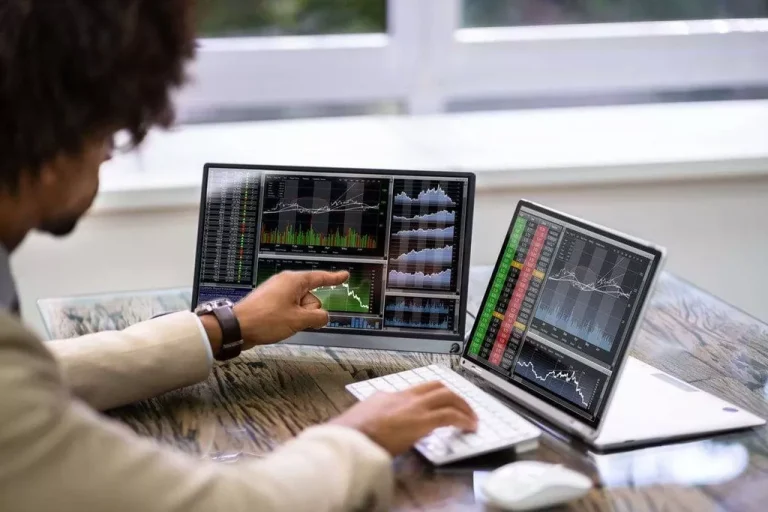Content
These pools offer a level of confidentiality that allows investors to avoid revealing their trading intentions to dark pool software the wider market, reducing the potential impact on prices. However, not all of this trading is done through public exchanges that everyone can access. You can see traces of dark pool trading transactions on the public markets by monitoring the internet as finance journalists regularly report on big trades.
What are the different Types of Dark Pools?
The CFA also estimates that dark pools are responsible for 15% of U.S. volume as of 2014. Dark pools are sometimes cast in an unfavorable light but they serve a purpose by allowing large trades to proceed without affecting the wider market. However, their lack of transparency makes them vulnerable to potential conflicts of interest by their owners and predatory trading practices by some Know your customer (KYC) high-frequency traders.

FBI Warns of Insecure Texting Systems Amid Major Telecommunications Breach
If the new data is reported only after the trade has been executed, however, the news has much less of an impact on the market. While direct participation in dark poolDark pools are private trading venues or exchanges where institutional investors, such as mutual funds, hedge funds, and pension funds, can trade large blocks of securities away fr… This involves careful analysis, often through third-party services, to understand institutional behavior and market dynamics better. The presence of dark pools in the market has undoubtedly influenced the dynamics of trading. By diverting a significant volume of trades away from public exchanges, dark pools have the potential to impact market liquidity and price discovery. Some argue that the prevalence of dark pool trading can lead to a two-tiered market, https://www.xcritical.com/ where retail investors may not have access to the same information or liquidity as institutional investors.
Is there any other context you can provide?
The pool operator matches buyers and sellers based on various factors, such as the price of the security and the time of the order. The trade is executed, and the transaction is reported to the parties involved once a match is made. This lack of transparency has led to concerns about market manipulation, but proponents argue that it allows for large trades without market disruption. The biggest advantage of dark pools is that market impact is significantly reduced for large orders.

How can you see dark pool trades?
Rather than displaying buy and sell orders on a public order book, dark pools match orders internally and execute them privately. The anonymity provided by dark pools adds an additional layer of privacy for traders, as their intentions and positions are not disclosed to other participants. Retail investors do not usually need to block trade shares in dark pools in the way that institutional investors do.
Dark pools are not required to disclose their trading volumes or the participants in their trades to the public, making it difficult for regulators to monitor them. The recent HFT controversy has drawn significant regulatory attention to dark pools. Regulators have generally viewed dark pools with suspicion because of their lack of transparency.
Using dark pools, large institutional traders and investors can buy and sell large chunks of assets without screaming to the world that they are getting in or out of the market, which could lead to attempted front-running. Overall, the growth of dark pools has reshaped the market landscape, introducing new dynamics and considerations for market participants and regulators alike. Online guidance on forums such as Reddit and Twitter accounts like MRC Dark Pool Trading are good places to go to look for discussions around dark pool trading brokers and strategies. There is a dark pool app by The Stock Whisperer that also offers strategy tips. Additionally, Ben Sturgill, author at Raging Bull, a trading platform to exchange tips and secrets, has built a dark pool scanner to monitor and flag large and unusual block trades.
Dark pools came about primarily to facilitate block trading by institutional investors who did not wish to impact the markets with their large orders and obtain adverse prices for their trades. They play a critical role in wealth management because they enable institutional investors to trade large blocks of securities without disrupting the market. Dark pools are also called «dark liquidity» pools because they allow investors to buy or sell large blocks of securities without affecting the market price. Scaling out of trades isn’t just about taking profit; it’s a comprehensive riskIn stock trading, risk refers to the possibility of losing some or all of the capital invested in a trade.
- However, dark pools are often criticized because of their lack of transparency.
- These strategies typically involve buying securities in the dark pool at a lower price than the public market and then selling them on the public market at a higher price, profiting from the difference.
- Examples of agency broker dark pools include Instinet, Liquidnet, and ITG Posit, while exchange-owned dark pools include those offered by BATS Trading and NYSE Euronext.
- Market orders are executed at the best available price in the dark pool trading.
- A dark pool in cryptocurrency is more or less the same as a dark pool in other equities markets, and is a place that matches buyers and sellers for large orders outside of a public exchange or view.
- 11 Financial may only transact business in those states in which it is registered, or qualifies for an exemption or exclusion from registration requirements.
- Professional traders in dark pools have a competitive and information advantage over retail investors dealing on public exchanges.
One notable example of dark pool trading is the case involving Barclays and Credit Suisse in 2016. Barclays settled for $70 million and Credit Suisse settled for $84.3 million, reflecting concerns around transparency and fairness in dark pool trading, leading to greater oversight and demands for stringent regulations. They use complex algorithms to match buyers and sellers and execute trades on their own accounts as well. Dark pools, sometimes referred to as “dark pools of liquidity,” are a type of alternative trading system used by large institutional investors to which the investing public does not have access. However, dark pools also have drawbacks, including a lack of transparency, potential for insider trading, and reduced price discovery. Another criticism of dark pools is the potential for insider trading or other forms of market manipulation.
HFT technology allows institutional traders to execute their orders of multimillion-share blocks ahead of other investors, capitalizing on fractional upticks or downticks in share prices. When subsequent orders are executed, profits are instantly obtained by HFT traders who then close out their positions. This form of legal piracy can occur dozens of times a day, reaping huge gains for HFT traders. For example, Bloomberg LP owns the dark pool Bloomberg Tradebook, which is registered with the SEC.
Dark Pool Trading for Dummies explained that this type of investing was designed for big institutions but became more prevalent thanks to high frequency trading in the traditional displayed stock markets. Dark pools are primarily used by institutional investors such as mutual funds, hedge funds, pension funds, insurance companies, broker-dealers, and sovereign wealth funds. To avoid driving down the price, the manager might spread out the trade over several days. But if other traders identify the institution or the fund that’s selling they could also sell, potentially driving down the price even further. Dark pool informational strategies are designed to take advantage of the information asymmetry that exists in the dark pool. For example, Goldman Sachs and SIGMA X are required to report trading data and adhere to transparency and fairness standards as mandated by regulatory authorities.
Detractors argue that the lack of transparency in dark pool trading may create opportunities for insider trading or unscrupulous practices. The lack of public scrutiny and oversight can raise ethical questions and potentially harm market integrity. Additionally, the reduced visibility of trades can make it difficult for regulators to monitor and detect any manipulative or fraudulent activities taking place in these private trading platforms. Leveraging dark poolDark pools are private trading venues or exchanges where institutional investors, such as mutual funds, hedge funds, and pension funds, can trade large blocks of securities away fr… Trading data to complement your technical indicators is as much an art as it is a science.
As a result, there is lesser transparency in the market and hence a lesser risk of prices getting affected. Because of this, institutional investors frequently use the dark pool, either because they don’t want the market to know what they’re buying before they do or because they want to use high-frequency trading (HFT). In the second case, they can trade large data blocks in milliseconds ahead of the other investors and get large profits. Dark pools are privately organized and highly advantageous to certain institutional investors like hedge funds who want to remain anonymous.
Strike offers a free trial along with a subscription to help traders and investors make better decisions in the stock market. It’s easy to get started when you open an investment account with SoFi Invest. You can invest in stocks, exchange-traded funds (ETFs), mutual funds, alternative funds, and more. SoFi doesn’t charge commissions, but other fees apply (full fee disclosure here). The same risk exists when buying large blocks of a given security on a public market, as the purchase itself can attract attention and drive up the price.
One measure that may help exchanges reclaim market share from dark pools and other off-exchange venues could be a pilot proposal from the Securities and Exchange Commission (SEC) to introduce a trade-at rule. Electronic market maker dark pools are offered by independent operators like Getco and Knight, who operate as principals for their own accounts. Like the dark pools owned by broker-dealers, their transaction prices are not calculated from the NBBO, so there is price discovery. With the advent of supercomputers capable of executing algorithmic-based programs over the course of just milliseconds, high-frequency trading (HFT) has come to dominate daily trading volume.

